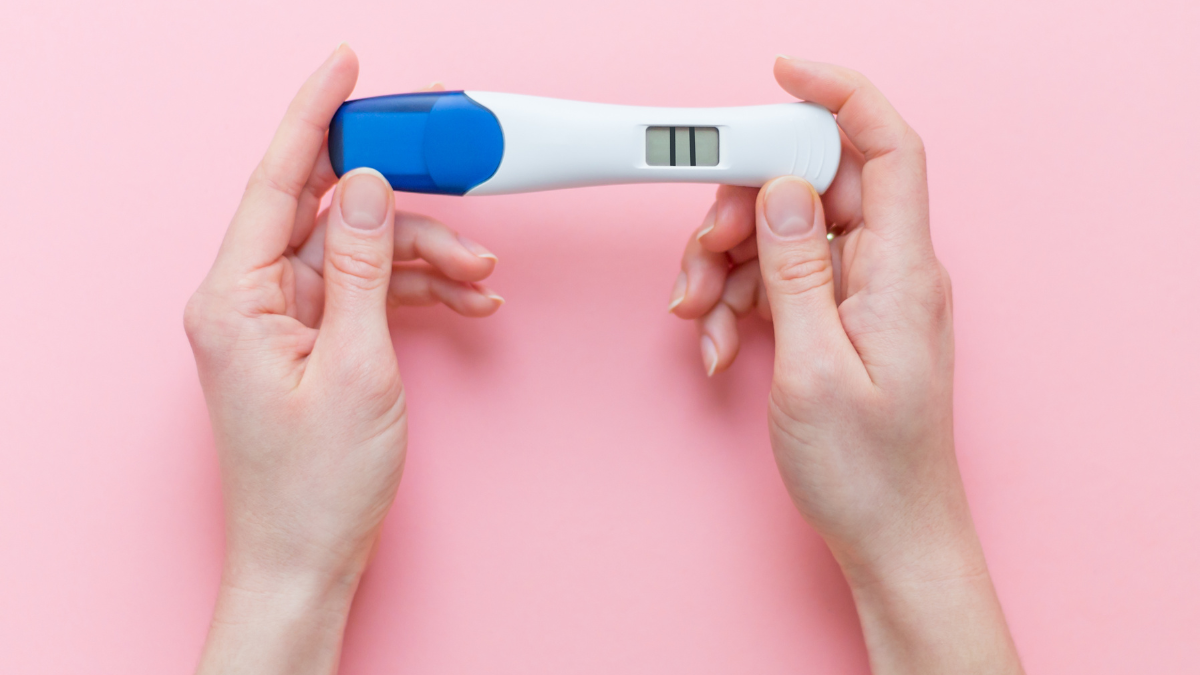You just found out you’re 4 weeks pregnant—or maybe you’re still wondering if that faint positive line really means something. At this stage, your body is already hard at work, even if you don’t feel very different yet. It’s one of the most exciting, nerve-wracking, and hopeful moments in early pregnancy. But what does being 4 weeks pregnant really mean? What should you expect, and what early signs can you look out for?
Being 4 weeks pregnant means you’re officially one month into your pregnancy journey, though it might not feel real just yet. The embryo is the size of a poppy seed, and many women begin noticing subtle symptoms, while others might feel completely normal. Whether you’re trying to conceive or just got a surprise, understanding what’s happening in your body right now can be empowering.
In this post, we’ll walk you through everything you need to know about being 4 weeks pregnant: the early symptoms, causes, benefits of awareness at this stage, and how it might affect your daily life. We’ll also help clear up some common myths and offer actionable tips to navigate this beautiful new chapter. Let’s dive in and embrace this precious week together.
Table of Contents
What is 4 Weeks Pregnant?
At 4 weeks pregnant, you’re in the early stages of the first trimester. This is typically the time when you would miss your period and possibly get a positive pregnancy test. Although the embryo is just beginning to develop, critical changes are happening in your body. The fertilized egg has implanted into the uterine wall, and your body has started producing the hormone hCG (human chorionic gonadotropin)—the hormone pregnancy tests detect.

From a medical standpoint, pregnancy is counted from the first day of your last menstrual period (LMP), which means conception likely occurred two weeks ago. So even though your baby is technically two weeks old, you’re already four weeks pregnant based on your LMP.
At this stage, it’s common to start feeling small changes like breast tenderness or fatigue. Being aware that you’re 4 weeks pregnant is crucial because your actions now can set the tone for a healthy pregnancy.
What to Eat at 4 Weeks Pregnant
At 4 weeks pregnant, your nutritional needs are beginning to change, even if your appetite hasn’t caught up yet. What you eat now plays a critical role in your baby’s earliest development. Focus on whole, nutrient-dense foods that support your body and the growing embryo.
Key nutrients to include:
- Folic Acid: Vital for preventing neural tube defects. Found in leafy greens, lentils, and fortified cereals.
- Iron: Supports increased blood production. Include lean red meat, beans, and spinach.
- Calcium: Helps form your baby’s bones and teeth. Drink milk or eat yogurt and cheese.
- Protein: Essential for cell growth. Eggs, poultry, nuts, and legumes are great sources.
- Omega-3 Fatty Acids: Boost brain development. Add flaxseeds, walnuts, or safe fish like salmon.
Avoid raw or undercooked meats, unpasteurized dairy, excessive caffeine, and alcohol. At 4 weeks pregnant, even minor dietary changes can make a major difference in your baby’s health.

How to Care for Yourself at 4 Weeks Pregnant
Caring for yourself when you’re 4 weeks pregnant sets the tone for a healthier and more comfortable pregnancy. This is the time to slow down, listen to your body, and build positive habits.
Here are self-care tips for 4 weeks pregnant moms:
- Start Prenatal Vitamins: Folic acid, iron, and DHA are crucial from this stage.
- Prioritize Rest: Fatigue is common, so allow yourself naps and early bedtimes.
- Hydrate Well: Water supports blood volume and flushes toxins.
- Move Gently: Light walks or prenatal yoga can ease bloating and reduce stress.
- Manage Stress: Deep breathing, journaling, or meditation helps you stay calm.
- Avoid Harmful Substances: Quit smoking, alcohol, and consult your doctor before taking medications.
Emotional care is just as important. If you’re feeling anxious or overwhelmed, talk to your partner, friend, or a professional. At 4 weeks pregnant, small choices today can create lasting benefits for both you and your baby.
Baby Development at 4 Weeks Pregnant
Even though you’re just 4 weeks pregnant, your baby is going through huge changes! Right now, your little one is about the size of a poppy seed, but their future is already taking shape.
Here’s what’s happening with your baby at 4 weeks pregnant:
- The fertilized egg has implanted into the uterus and is now called a blastocyst.
- Cells are rapidly dividing to form the embryo and placenta.
- The neural tube (which becomes the brain and spinal cord) is beginning to develop.
- Early structures of the heart, blood vessels, and digestive system are forming.
Your baby is getting all its nutrients from the yolk sac at this point, but soon the placenta will take over. This is a vital stage of pregnancy, which is why eating well and taking prenatal vitamins is so important. While you can’t feel your baby yet, everything is in motion to support their growth and development.

Sample Meal Plan for 4 Weeks Pregnant Moms
Not sure what to eat now that you’re 4 weeks pregnant? Here’s a simple and balanced one-day meal plan to help you get the nutrients you need while keeping things easy and delicious.
Breakfast:
- Scrambled eggs with spinach and whole-grain toast
- A glass of fortified orange juice (for vitamin C and folic acid)
Mid-Morning Snack:
- A small banana with a handful of almonds
Lunch:
- Grilled chicken salad with leafy greens, tomatoes, carrots, and avocado
- Quinoa or brown rice on the side
- Low-fat yogurt with berries for dessert
Afternoon Snack:
- Whole-grain crackers with hummus
- Herbal tea (non-caffeinated)
Dinner:
- Baked salmon or tofu with steamed broccoli and sweet potato
- A small bowl of lentil soup
Evening Snack (if needed):
- Warm milk with a slice of whole-grain toast and almond butter
This meal plan supports your energy levels and provides essential nutrients while minimizing nausea or bloating, two common symptoms when you’re 4 weeks pregnant.
What to Do If You Suspect You’re Pregnant at 4 Weeks
Think you might be 4 weeks pregnant but haven’t confirmed it yet? Here’s what you should do next to stay safe and informed.
1. Take a Pregnancy Test
Home pregnancy tests are generally accurate by the time you’re 4 weeks pregnant. Use first-morning urine for best results.
2. Confirm with a Doctor
Schedule an appointment for a blood test or early ultrasound to confirm the pregnancy and check hormone levels.
3. Start Prenatal Vitamins
Even if your pregnancy isn’t confirmed yet, it’s safe and smart to begin taking folic acid and other essential supplements.
4. Avoid Risky Habits
Stop smoking, drinking alcohol, and limit caffeine. These small changes make a big impact early on.
5. Begin Tracking Symptoms
Notice fatigue, breast tenderness, or light cramping? Keep a log—it helps your healthcare provider understand your body’s changes.
6. Reach Out for Support
Whether it’s a trusted friend or your partner, talk about what you’re feeling. The emotional aspect is just as important.
If you think you might be 4 weeks pregnant, early awareness and care are key to a healthy pregnancy journey.
Causes of 4 Weeks Pregnant Symptoms
The symptoms you might experience at 4 weeks pregnant are primarily caused by hormonal changes in your body. As the fertilized egg implants itself into the uterine lining, your body ramps up production of hCG, estrogen, and progesterone. These hormones are responsible for triggering early pregnancy signs.
- hCG supports the developing embryo and signals your body to stop your menstrual cycle.
- Progesterone helps thicken the uterine lining and supports the pregnancy.
- Estrogen increases blood flow and also plays a key role in fetal development.
These hormonal shifts can cause everything from mood swings and fatigue to mild cramping and bloating. Every woman’s body reacts differently, so you might experience all, some, or none of these early symptoms. The key takeaway is that these signs are normal and a positive indicator that your pregnancy is progressing.
Benefits of Knowing You’re 4 Weeks Pregnant
Understanding that you’re 4 weeks pregnant comes with several emotional, physical, and practical benefits. Early knowledge gives you the opportunity to care for yourself and your baby right from the start.
Here are some major benefits of early awareness:
- Early prenatal care: You can begin taking prenatal vitamins rich in folic acid, which helps prevent neural tube defects.
- Lifestyle adjustments: It’s the perfect time to eliminate harmful habits like smoking, drinking alcohol, or excessive caffeine intake.
- Diet and nutrition: You can now focus on eating nutrient-rich foods that support your baby’s growth and your overall health.
- Mental preparation: Knowing you’re pregnant gives you time to prepare emotionally and mentally for the journey ahead.
- Building a support system: Whether it’s telling your partner or booking your first doctor appointment, early knowledge helps you seek the support you need.
Physically, your body starts adjusting, and mentally, you’re beginning to embrace the idea of motherhood. That sense of awareness can reduce stress, help you track symptoms more accurately, and make you feel more in control. So, if you’ve just found out you’re 4 weeks pregnant, celebrate that awareness. It’s a small but powerful step forward.

Impact of Being 4 Weeks Pregnant on Daily Life
Being 4 weeks pregnant may not visibly alter your daily routine just yet, but it can influence how you feel and how you move through your day. For many women, the earliest symptoms are more subtle, yet they can still affect sleep, focus, mood, and energy levels.
For example, fatigue is one of the most common signs at this stage. You may feel unusually tired even after a full night’s sleep. This can make your workday feel longer or reduce your motivation to engage in regular activities. Your body is doing a lot of unseen work, and that internal effort shows up in the form of tiredness and mood swings.
You might also notice more frequent urination, tender breasts, or light cramping. These physical changes may be manageable, but they serve as daily reminders of the new life growing inside you. Emotionally, excitement and anxiety often go hand-in-hand. You may find yourself daydreaming about baby names or worrying about every little ache.
Relationships can shift, too. Your partner might become more protective, or you may choose to confide in a close friend for support. At 4 weeks pregnant, even small lifestyle changes—like skipping sushi or getting more rest—can significantly affect how you feel. In short, this week may be the beginning of big changes in your daily life.
How to Take Care of Yourself at 4 Weeks Pregnant
Caring for yourself at 4 weeks pregnant means starting good habits early. Even small steps can make a big difference in your baby’s development and your overall well-being.
Here are some practical tips to follow:
- Start Prenatal Vitamins
Choose vitamins with folic acid (at least 400–800 mcg), iron, and DHA. These support fetal brain and spine development. - Eat a Balanced Diet
Include lean proteins, whole grains, leafy greens, fruits, and dairy. Avoid raw fish, unpasteurized cheeses, and processed foods. - Stay Hydrated
Drink plenty of water to support increased blood volume and prevent dehydration, which can worsen fatigue and cramps. - Get Enough Rest
Fatigue is normal at 4 weeks of pregnancy. Allow yourself extra naps or downtime whenever possible. - Avoid Harmful Substances
Say no to alcohol, smoking, and over-the-counter medications unless approved by your doctor. - Listen to Your Body
Mild cramping or emotional ups and downs are common. But if you notice heavy bleeding or severe pain, contact your doctor. - Schedule a Prenatal Appointment
You may not need to visit the doctor immediately, but getting your first appointment on the calendar helps you feel prepared. - Track Your Symptoms
Use a pregnancy journal or app to record changes. It’s a great way to stay informed and ease anxiety.
Taking these steps while you’re 4 weeks pregnant sets a healthy foundation for the months ahead. Early habits often shape long-term outcomes—both for you and your baby.
Common Myths About Being 4 Weeks Pregnant
There are several misconceptions about being 4 weeks pregnant. Let’s debunk a few to keep you informed and confident:
- Myth: You can’t be pregnant if you don’t feel symptoms.
Fact: Some women have no symptoms at 4 weeks pregnant and still have healthy pregnancies. - Myth: A faint line on a test means it’s not a real pregnancy.
Fact: A faint positive still means you’re pregnant—hCG levels double every 48–72 hours. - Myth: Spotting means miscarriage.
Fact: Light spotting can be normal and is often a sign of implantation. - Myth: You should be eating for two.
Fact: Calorie needs don’t increase significantly during the first trimester.
Knowing what’s true and what’s not helps you avoid unnecessary worry and focus on what matters—your well-being and that of your growing baby.
Frequently Asked Questions (FAQ)
Q1: What is 4 weeks pregnant in simple terms?
A: Being 4 weeks pregnant means your fertilized egg has implanted, and your body is beginning to support a growing baby.
Q2: What causes 4 weeks pregnant symptoms?
A: Early pregnancy hormones like hCG, progesterone, and estrogen cause common symptoms like fatigue, cramping, and nausea.
Q3: How can knowing I’m 4 weeks pregnant improve my life?
A: It helps you begin prenatal care early, make healthier choices, and prepare mentally for pregnancy.
Q4: Is being 4 weeks pregnant scientifically proven to show symptoms?
A: Yes, many early pregnancy symptoms are backed by hormonal and physiological changes documented in medical research.
Q5: How long does it take to feel different at 4 weeks pregnant?
A: Some women feel changes right away, while others may notice symptoms over the next few weeks.
Q6: Can anyone feel symptoms at 4 weeks pregnant?
A: Not necessarily. Every pregnancy is unique—some women feel strong symptoms, others feel none.
Q7: What’s the best way to start caring at 4 weeks pregnant today?
A: Start taking prenatal vitamins, eat balanced meals, avoid harmful substances, and schedule your first doctor visit.
Conclusion
Being 4 weeks pregnant is the very beginning of an incredible transformation—both inside and out. While the baby is still microscopic, the changes happening in your body are powerful. You may be experiencing mild symptoms, or you might still be in disbelief. Either way, this stage is just as important as any other in your pregnancy journey.
Now that you know what to expect at 4 weeks pregnant, you’re already taking a step toward a healthier, more informed experience. From hormonal shifts and early symptoms to practical care tips and emotional adjustments—everything starts taking shape now.
Remember, every pregnancy is different. So don’t stress if your journey doesn’t look like someone else’s. Embrace your body’s signals, make informed choices, and lean on support when you need it. This is just the beginning of something beautiful.
💬 Let us know in the comments how you felt at 4 weeks pregnant or if you’ve just found out! Don’t forget to share this post with someone who’s just beginning their pregnancy journey. 💕







